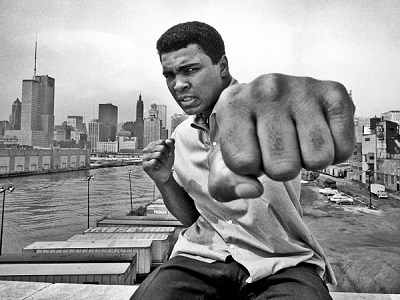
By Jamal Kanj
It is fair to assume that most readers today can’t name the current heavyweight boxing champion. The same people would, however, most likely name the champion from 50 years ago.
That’s what makes Muhammad Ali unique. The champ or the “greatest” brought a special aura to the ring. It didn’t matter whether it was the formidable US government in court, or fighting the unbeatable in the boxing ring – he won.
I grew up with Muhammad Ali’s memories. In the 1960s, I lived in a Palestinian refugee camp in north Lebanon where we had no electricity. My father and his friends gathered around a battery powered radio listening live to the broadcast of Muhammad Ali’s fights. He was the subject of conversations in homes and among pupils at school.
We followed his battle in US courts when he refused induction in the army during the Vietnam War. He was stripped of his championship and served time in prison. Years later, we also celebrated the US Supreme Court’s unanimous knockout ruling (8-0) reversing his earlier verdict.
I remember, albeit with a tinge of jealousy, his 1974 visit to another Palestinian refugee camp in south Lebanon. He saw first-hand that Israel wasn‘t the panacea for Jewish refugees. But it was the product of an ideology that exploited Jewish suffering in Europe to justify the making of Palestinian refugees in another part of the world.
After his visit to Ein El Hilwa camp, the champ decried Zionism’s influence on US politics and avowed “support for the Palestinian struggle to liberate their homeland and oust the Zionist invaders”.
Four years later, I attended college in Houston, Texas, and worked a night-shift, six-to-six, at a Gulf self-service petrol station. This shift allowed me to go to school during the day and study inside the kiosk during low traffic in the early morning hours.
On Friday September 15, 1978, I had a conflict with my work schedule. I wanted to watch Muhammad Ali’s fight against Leon Spinks in New Orleans. My job paid the minimum $2.35 per hour and I couldn’t afford taking the night off. To watch the fight, however, I risked my job and hid a small 12 inch black and white TV under the counter inside the kiosk. The rented TV ended up costing almost half of my wage for the night. But it was all worth it, for it was Muhammad Ali’s third and last time in his career to regain the World Championship title.
Even while very sick, Ali never back away from a fight. Last December, Republican candidate, Donald Trump, called for a ban “on Muslims entering the US”. Ali admonished him and called on political leaders “to use their position to bring understanding” and “clarify these misguided murderers (IS) who have perverted people’s views on what Islam really is”.
In the same week, the now Republican presumptive nominee, Trump, ridiculed US President Barak Obama for saying, “Muslims are our sporting heroes.” Trump tweeted back: “What sport is he (Obama) talking about, and who?”
Still, on June third Trump tweeted: “Muhammad Ali is dead at 74! A truly great champion and a wonderful guy”.
It took Trump only six months to answer his own question.
Trump is an opportunist and schadenfreude. He got “excited” by the housing meltdown in 2008, and to vindicate his racist views, he slobbered over the blood of the Orlando gay bar victims.
This is an American tale of two men: One who was inspired by his belief to object to an unjust war. And a rich child who supported the war, but his wealthy father bought him a medical exemption to escape it.
Today, we mourn the life of the conscientious objector-turned-humanitarian activist, and dread the draft-dodger morphed into an immature politician vying to become US president with the power to send more poor children to new wars.
-Jamal Kanj (www.jamalkanj.com) writes regular newspaper column and publishes on several websites on Arab world issues. He is the author of “Children of Catastrophe,” Journey from a Palestinian Refugee Camp to America. He contributed this article to PalestineChronicle.com. (A version of this article was first published by the Gulf Daily News newspaper.)





